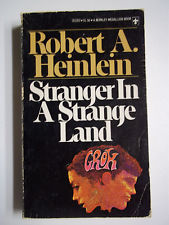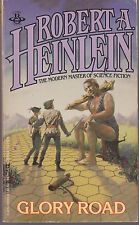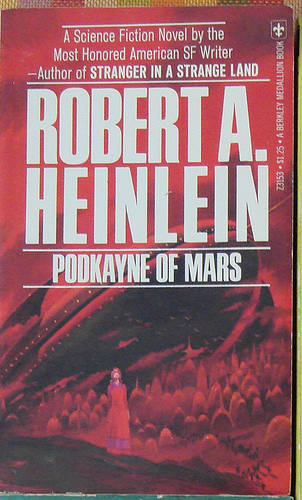 I read Stranger in a Strange Land years ago, and I didn’t much like it then. I re-read it as part of my Robert Heinlein reading project, hoping that I would like it more this time, and I did enjoy part of it, but not all of it.
I read Stranger in a Strange Land years ago, and I didn’t much like it then. I re-read it as part of my Robert Heinlein reading project, hoping that I would like it more this time, and I did enjoy part of it, but not all of it.
Here’s the usual spoiler warning–if you haven’t read Stranger in a Strange Land, then this review WILL spoil some of the plot for you.
The premise is that Michael Valentine Smith was raised on Mars by Martians, who are far stranger than we could ever have imagined. He has learned, via his strange upbringing, a variety of what we would now call superpowers. He’s telepathic and telekinetic, and he has almost complete control over his own body, kinda like an Indian yogi.
The first third or so of the book is about Smith’s return to Earth. As the sole surviving heir of the crew that explored Mars, he has legal rights to the entire planet, but all kinds of government interests want to take advantage of his naivete. A nurse and a journalist sneak him out and into the care of Jubal Harshaw, a lawyer and doctor who spends most of his time writing novels.
Harshaw becomes a father figure for Michael, and he handles the negotiations between him and the powers-that-be. Harshaw is clearly the Heinlein surrogate in the story. He’s cranky, irascible, and he knows everything.
This section of the book was hugely entertaining. It has a beginning, a middle, and an end, and it also has a clear conflict.
The rest of the novel falls a little more flat. Michael Smith begins to educate himself about the planet Earth and how humans live. He eventually begins his own religion. There’s a lot of hippy stuff related to free love that was probably a lot of fun for Heinlein to write about. It was less fun to read.
Heinlein seems to enjoy attacking the mores of modern society. Not only does he poke the readers’s sensibilities about sex, but he also addresses ritual cannibalism.
His writing is also quite chauvinistic, but it’s chauvinistic in that 1950s way, where he seems to think he’s enlightened and cares about women’s rights, when really he’s just as guilty of the kind of behavior he pretends to condemn. At one point, one of the characters explains that “9 times out of 10, it’s the woman’s fault”. I found that extremely disappointing, even for someone writing in the late 1950s/early 1960s.
Stranger in a Strange Land also seems to want to convince the reader of its own importance. I came away from it with the sense that it was meant to be an “Important Book”.
But it’s not really as profound as it hoped it would be. Then again, maybe I’m just a produce of my times. In one of my other reviews, I mentioned that at the time the book was published, it was probably considered really groundbreaking. Not so much, anymore.
What did other bloggers think of Stranger in a Strange Land?
- “Stranger in a Strange Land starts off well. It appears to be a fun science-fiction story about a human raised among the Martians that returns to Earth and has a huge cultural shock while having to deal with all of Earth’s bureaucracy. I really enjoyed the descriptions of the Martian civilisation and bow it differs from ours, and the plots of the administration to make the protagonist, Valentine Michael Smith, sign over his rights. Unfortunately, this part only lasts for the first couple of hundred pages or so.” – Just a World Away
- “Does Heinlein really believe this tripe? Can this be the same author who wrote Starship Troopers?” – dobeka’s blog
- “I was fortunate to get to the Saint Louis Museum of Art after I’d read SIASF. They have several works by Rodin and I was, of course, struck. What has always amazed me about his work are the faces, the hands and the feet.” – Popke
 E.C. Gordon has just gotten out of the military. He’s a veteran of the Vietnam War, and he spots a personal ad as he’s deciding what to do with his life. The personal ad describes him perfectly, and it’s advertising for a “hero”.
E.C. Gordon has just gotten out of the military. He’s a veteran of the Vietnam War, and he spots a personal ad as he’s deciding what to do with his life. The personal ad describes him perfectly, and it’s advertising for a “hero”. This review of Podkayne of Mars contains plot spoilers. You’ve been warned.
This review of Podkayne of Mars contains plot spoilers. You’ve been warned. I started my journey through the works of Robert Heinlein with a used paperback of Farnham’s Freehold, which I’d never read before. Sure, I’d heard of it. A few years ago I read a few websites and books about survivalism, and Farnham’s Freehold is popular among those types. I wasn’t sure what to expect from the actual novel, though. I didn’t read any spoilers of any kind.
I started my journey through the works of Robert Heinlein with a used paperback of Farnham’s Freehold, which I’d never read before. Sure, I’d heard of it. A few years ago I read a few websites and books about survivalism, and Farnham’s Freehold is popular among those types. I wasn’t sure what to expect from the actual novel, though. I didn’t read any spoilers of any kind.